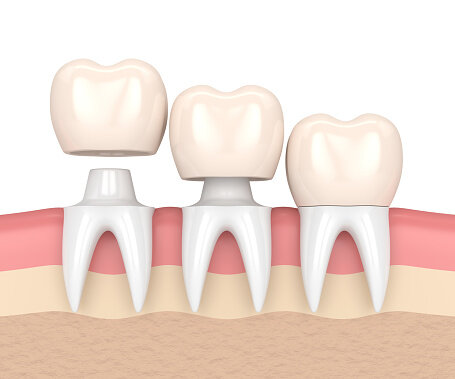If you are looking to save a tooth that has been severely damaged, you may be discussing dental crowns with us soon. A dental crown is a cap that is placed on top of a damaged tooth. This cap is tooth-shaped and is used to cover, protect and restore the function and appearance of teeth.
When is a Dental Crown Needed?
Dental crowns are needed to:
Cap a decayed or damaged tooth
Protect teeth after a dental implant
Protect teeth after a root canal treatment
Hold together a tooth that is cracked
Hold dental bridges in place
Improve discolored teeth
Depending on your specific situation, our doctors will suggest a crown material from the following crown types:
Ceramic
Porcelain fused to metal
Metal
Dental Crown Preparation
We conduct a few steps to assess and trim your tooth for a dental crown. Patients who have deep cavities need to have a root canal treatment performed first. In addition, if there isn’t much of the original tooth left above the gum line, we might use a filler material to build a foundation for the dental crown.
Under normal circumstances, getting a crown requires a minimum of two visits. During the first appointment, we might trim your tooth down so that the dental crown can fit comfortably. A dental impression is then taken for the formation of the crown.
A temporary crown is then fitted on the tooth. Lastly, the dental laboratory uses the impression to make the final crown. At your next appointment, our dentist will remove the temporary crown and replace it with the permanent one.
Once the crown is in place, you might experience some sensitivity, which often means that the crown needs further adjustment. Make sure to brush and floss regularly so that your gum line and crown remain healthy and in optimal conditions.
To schedule an appointment with us and benefit from high-quality dental services, contact our offices in Milwaukie or Oregon City today!





















